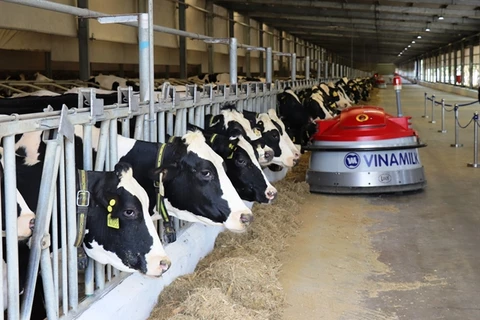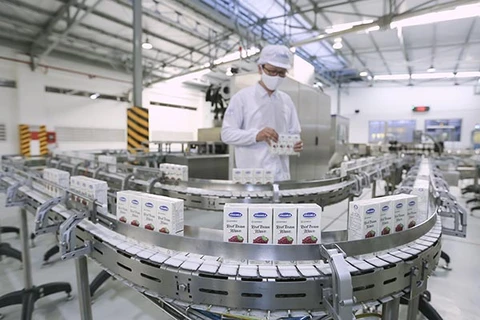HCM City (VNS/VNA) - The fast moving consumer goods sector is forecast to grow at 6.4 percent this year in the country’s four major cities and 8.7 percent in rural areas, according to global data and consulting company Kantar Worldpanel.
Growth in packaged foods is expected to fall from last year in Hanoi, Ho Chi Minh City, Da Nang, and Can Tho though the rate will still be around 10 percent, while personal care products are set to grow in double digits.
In rural areas, personal care products potentially will continue to drive growth, while the beverages segment will recover.
Last year, FMCG sales grew at 10.3 percent and 10.2 percent in cities and rural areas, mainly driven by higher volumes as prices remained steady.
Nelson Woo, regional commercial director, Worldpanel Division Asia, Kantar, said with its population of more than 90 million Vietnam remains a prime market for both local and regional FMCG players.
“A relatively young consumer base, growing per capita income and increasing sophistication of use in both mobile and tech puts Vietnam high on the attractiveness index for investors, brands and manufacturers.
“Vietnam also has a great geographic advantage bordering many Asian countries such as China and the emerging markets of Indo-China, giving it a massive advantage as not only a country with local consumption but also a hub to reach other markets.”
The country is now the sixth most populous in Asia behind China, India, Indonesia, Japan, and the Philippines and could easily rise to fifth, he said.
Coupled with improvements in the standard of living and growth in both organised trade and e-commerce, it is a market no brand or manufacturer would want to miss, he added.
In 2020 Vietnam’s economy grew at 2.9 percent despite the COVID-19 pandemic, a testament to its resilience and strength to cope with challenges, which gives it a big competitive edge over other ASEAN countries.
Quality Assurance
Quality has been an increasingly important concern among Vietnamese consumers, especially with regard to foods. With the middle class expanding rapidly, the willingness to pay for higher quality products is also growing.
Consumers have higher expectations when it comes to production methods and quality, but also packaging and other features of food products.
Reliable information about origins and production processes is becoming increasingly important. Now, before making purchase decisions, they are spending more time searching for in-depth information about products from various sources, either people they know or social groups.
In the next few years consumers might be looking out for clearer visibility of when, where and how products were sourced, produced and delivered to them.
Brands should understand that to meet customers’ expectation.
Technology allows manufacturers to offer consumers complete transparency about all steps in the production process./.
Growth in packaged foods is expected to fall from last year in Hanoi, Ho Chi Minh City, Da Nang, and Can Tho though the rate will still be around 10 percent, while personal care products are set to grow in double digits.
In rural areas, personal care products potentially will continue to drive growth, while the beverages segment will recover.
Last year, FMCG sales grew at 10.3 percent and 10.2 percent in cities and rural areas, mainly driven by higher volumes as prices remained steady.
Nelson Woo, regional commercial director, Worldpanel Division Asia, Kantar, said with its population of more than 90 million Vietnam remains a prime market for both local and regional FMCG players.
“A relatively young consumer base, growing per capita income and increasing sophistication of use in both mobile and tech puts Vietnam high on the attractiveness index for investors, brands and manufacturers.
“Vietnam also has a great geographic advantage bordering many Asian countries such as China and the emerging markets of Indo-China, giving it a massive advantage as not only a country with local consumption but also a hub to reach other markets.”
The country is now the sixth most populous in Asia behind China, India, Indonesia, Japan, and the Philippines and could easily rise to fifth, he said.
Coupled with improvements in the standard of living and growth in both organised trade and e-commerce, it is a market no brand or manufacturer would want to miss, he added.
In 2020 Vietnam’s economy grew at 2.9 percent despite the COVID-19 pandemic, a testament to its resilience and strength to cope with challenges, which gives it a big competitive edge over other ASEAN countries.
Quality Assurance
Quality has been an increasingly important concern among Vietnamese consumers, especially with regard to foods. With the middle class expanding rapidly, the willingness to pay for higher quality products is also growing.
Consumers have higher expectations when it comes to production methods and quality, but also packaging and other features of food products.
Reliable information about origins and production processes is becoming increasingly important. Now, before making purchase decisions, they are spending more time searching for in-depth information about products from various sources, either people they know or social groups.
In the next few years consumers might be looking out for clearer visibility of when, where and how products were sourced, produced and delivered to them.
Brands should understand that to meet customers’ expectation.
Technology allows manufacturers to offer consumers complete transparency about all steps in the production process./.
VNA






















